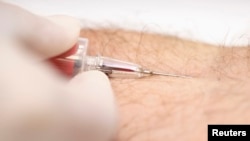Could savings accounts reduce the spread of HIV?
New research concludes buffering people from financial shocks may help keep them from resorting to risky behaviors that spread the virus.
The researchers found higher rates of HIV among villages in sub-Saharan Africa that had experienced drought in the previous 10 years. They reported that people were apparently coping with the crisis by trading sex for support. But transactional sex raises the risk that they will become infected.
The study says measures such as better access to savings accounts and credit, weather-indexed crop insurance and more drought-tolerant crops could cushion the blow from money troubles, and ultimately curtail the spread of HIV.
Life without a net
Few people in the developing world have much in the way of savings, according to economist and study co-author Kelly Jones at the International Food Policy Research Institute. “When they have a bad week or a bad month, they often don’t have any way to cover themselves,” she said.
In rural sub-Saharan Africa, bad financial news often comes in the form of drought in villages that depend on rain-fed agriculture.
So Jones and colleagues looked at available data on HIV patients in 19 African countries that included the locations of the patients' villages. They then compared those locations to precipitation maps showing where droughts had hit in the previous decade.
Writing in The Economic Journal, they report that the more droughts a village had suffered through, the higher the rate of HIV in that village — an 11 percent increase in prevalence for every drought in the past 10 years.
'Pretty important factor'
That suggests drought vulnerability is a substantial piece of the HIV puzzle in sub-Saharan Africa, said University of California-Berkeley economist Edward Miguel, who was not part of the research.
“To find a new factor that no one had thought of and already be explaining 11 percent, I think from a social science research perspective, that suggests that’s a pretty important factor,” he said.
In fact, the researchers found it helped to explain about a fifth of the differences in HIV rates among African countries.
They didn’t study directly how HIV was spreading. But they found some clues.
People who had been through droughts were 10 to 15 percent more likely to have had sex with someone other than their spouses.
Another hint lay in the occupations of those with the highest HIV rates: women in agriculture and nonfarming men.
It’s not direct evidence, Jones said, but it “does suggest some pairing of the women who are experiencing that income shock with the men who are least affected by that shock.”
Drought, instability and health
Other research has shown that crime and political instability in Africa grow after droughts.
“This evidence makes the case really convincingly that these economic shocks caused by drought don’t just lead to social instability, don’t just lead to political instability, but also have huge health consequences,” Miguel added.
Jones and colleagues are now studying whether helping both rural and urban women save more money lowers their risk of HIV.
“Many people are without access to the financial products that can help them smooth life’s ups and downs,” she said. “Whatever we can do to help people reduce their income risk is going to have potentially far-reaching benefits.”




